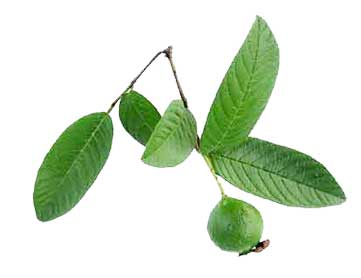
Botany Chemical constituents and properties Uses Nutrition Very high in vitamin C (80 mg in 100 gm of fruit) with large amounts of vitamin A. Fruit can be eaten raw or canned, jellied, juiced or powdered. Folkloric Astringent, antispasmodic, anthelminthic and antiseptic properties. Leaves used for wounds and toothache must always be fresh. Decoction or infusion of fresh leaves used for wound cleaning to prevent infection and to facilitate healing. Warm decoction of leaves for aromatic baths. For diarrhea, boil for 15 minutes 4 to 6 tablespoons of chopped leaves in 18 ounces of water. Strain and cool. Drink 1/4 of the decoction every 3 - 4 hours. For toothache, cew 2-3 young leaves and put into the tooth cavity; For gum swelling, chew leaves or use the leaf decoction as mouthwash 3 times daily; chewed leaves. For skin ulcers, pruritic or infected wounds: Apply decoction of leaves or unripe fruit as wash or the leaf poultice on the wound or use the decoction for wound cleansing. It is also popularly used for the wound healing of circumcision wounds. Nosebleeds: Densely roll the bayabas leaves and place into the nostril cavity. Vaginal wash: Because of antiseptic properties, warm decoction of leaves as vaginal wash (after childbirth) or douche. Cosmetic Leaf extract used in skin whitening products. Dental Toothbrush au-natural: Bayabas twigs, chewed at the ends until frayed, used as alternative for toothbrushing with whitening effect. Others Wood is suitalbe for carpentry, turnery, fuel or charcoal. A favorite rural use for tool handles. Studies • Assessment of two medicinal plants, Psidium guajava L. and Achillea millefolium L., in in vitro and in vivo assays: Study on the cytotoxicity and mutagenicity of the plants provide info on its safety for use as therapeutic agents. • Antihypertensive / Antidiarrheal: In the study, P guajava leaf extracts was more active than D mespiliformis in their antagonistic effects on caffeine-induced calcium release from the sarcoplasmic retidculum of rat skeletal muscle. Results might explain their use as antihypertensive and antidiarrheal agents in traditional medicine through an inhibition of intracellular calcium release. • Anticestodal: Anticestodal efficacy of Psidium guajava against experimental Hymenolepis diminuta infection in rats : The study showed anticestodal efficacy and supports folkloric medicinal use in the treatment of intestinal-worm infections in northeast India. • Hypoglycaemic / Hypotensive: The leaf of Psidium guajava is used extensively in African folk medicine. The study shows that the aqueous leaf extract of P. guajava possesses hypoglycemic and hypotensive properties and provides pharmaco credence to the folkloric use of the plant for type-2 diabetes and hypertension in some rural African communities. • Microbicidal: (1) Microbicidal effect of medicinal plant extracts (Psidium guajava Linn. and Carica papaya Linn.) upon bacteria isolated from fish muscle and known to induce diarrhea in children: Study concludes that guava sprout extracts is a feasible treatment option for diarrhea caused by E coli or S aureus-produced toxins, with quick curative effect, easy availability and low cost. (2) Aequeous extracts of leaves have shown antimicrobial activity against Shigella spp., Vibrio spp., S aureus, B-strep, E coli, P aeruginosa and B subtilis. • Guava Extracts and Radiolabelling: Study showed aqueous PG extract could present antioxidant action and affect membrane structures in ion transport altering radiolabelling of blood constituents with Technitium (Tc99m) and precautions applied to nuclear medicine procedures on patients using guava extracts. • Antidiabetic: Study of extract of leaves of PG showed to possess antidiabetic effect in type 2 diabetic mice model, the effect in part, mediated via the inhibition of PTP1B (protein tyrosine phosphatase 1B). • Phytochemical / Trypanocidal: Study showed that PG leaf extract possessed trypanocidal properties attributed to broad antimicrobial and iron chelating activity of flavonoids and tannins. Iron chelation was suggested as a effective way of killing trypanosomes. • Antitumor: Study showed P guajava extracts to be efficacious in preventing tumor development by depressing Tr cells (regulatory). • Antioxidant: Study of methanolic extract of PG leaves showed in vitro free radical scavenging activity. • Antiproliferative / Anticancer: A study on the antiproliferative activity of essential oil from 17 thai medicinal plants on human mouth epidermal carcioma (KB) and murine leukemia (P388) cell lines. In the KB cell line, Psidium guajava leaf oil showed the highest anti-proliferative activity, more than 4x more potent than vincristine. The results suggested the potential of Thai medicinal plants for cancer treatment. • Antidiarrheal / Microbicidal: (1) A study concludes that guava sprout extracts is a feasible treatment option for diarrhea caused by E coli or S aureus-produced toxins, with quick curative action, easy accessibility and low cost. (2) A morphine-like spasmolytic action involving the inhibition of acetylcholine release and the transmural transport of electrolytes and water has been reported as possible modes of antidiarrheal action of P guajava leaf extracts. The extract also inhibited the growth of causative agents for enteric fecver, food poisoning, dysentery and cholera. • Antispasmodic: In a study of acute diarrheic disease, a phytodrug developed from guava leaves, standardized with its quercetin content, exhibited a decrease in the duration of abdominal pain. • Antioxidant / Hypocholeterolemic: A study done to determine the effects of guava consumption on antioxidant status and lipid profile in normal male youth showed a significant increase in level of total antioxidants and reduced oxidative stress and also increase the level of HDL cholesterol significantly. • Anti-Ulcer: Study showed rats pretreated with P guajava extract from fresh tender leaves showed antiulcer activity in aspirin-induced gastric ulcer model with a significant reduction of ulcer index, pepsin activity, free and total acidity, volume and mucus content of gastric juice. |





No comments:
Post a Comment